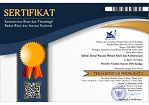Justifikasi hukum Islam atas pajak dalam perspektif hukum dan ekonomika
Abstract
In the earliest period of islam, islam introduced jizya, kharaj, and 'ushr as taxes. In its development, taxes are expanded into more complex types such as: income tax, value added tax, land tax, and customs. This expansion of tax base requires justification of how extent islamic law covers scope for expansions of tax base. This paper uses a law and economics approach to examine the range of islamic law to conform scope for expansions of tax base. The paper scrutinises in advance a common dilemma between Islamic law and law and economics in dealing with taxes: budgetair and deadweight loss. To achieve welfare, good taxes concern several aspects, among other: a large number of tax object, cross demand elasticity, a impact of reducing the gap, and low cost administration.
Keywords
Full Text:
PDFDOI: https://doi.org/10.18326/ijtihad.v18i1.1-16
Refbacks
- There are currently no refbacks.

This work is licensed under a Creative Commons Attribution-ShareAlike 4.0 International License.
Ijtihad: Jurnal Wacana Hukum Islam dan Kemanusiaan by http://ijtihad.iainsalatiga.ac.id/ is licensed under a Creative Commons Attribution-ShareAlike 4.0 International License







